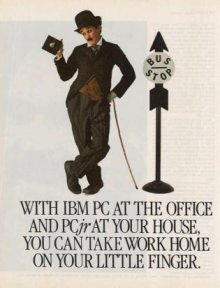Microsoft and the PCjr


I was thinking of the IBM PCjr. (Get a full-size print of this classic PCjr ad for just $11.99 at Adaholic.)
The PCjr was a crippled version of the IBM PC, then the market leader. This particular ad ran the same month the Apple Macintosh was announced.
What most people remember about the PCjr was its "chicklet" keyboard, but it was not-quite-a-PC in many other ways. It was less expandable and cheaply made. It was a failure.
Today's Netbooks are crippled in similar ways to the PCjr, one reason I'm heading to Taiwan in June for CompuTex. You could ask, as Ed Bott does, why then can't you just live with the limits of the cheapo Windows 7 "starter edition" software.
Why? Because Moore's Law does not stand still. Today's Netbooks are terribly limited but within two years, you will be able to get much better product for about the same price.
That will be the Linux opportunity. Personally I can't see using a lot of applications at once on today's Netbooks. But that's not because of their processor or memory limitations. It's that four-finger keyboard.
Today's Netbooks are road machines, cheap, rugged Internet clients. Tomorrow's may be the server to a handheld client, perhaps one running Google's Android, which the Linux Foundation folks insist is a Linux distro. If your client and server become compatible, that's the usability sweet spot.
That's what Microsoft should most fear. Moore's Law holds that better-and-better comes faster-and-faster. It's not the 2009 Netbooks that Microsoft needs to worry about, but those that will emerge in 2011and beyond. Their price will stay low. Their capabilities will simply rise.
By then, Windows 7 Starter Edition really will be the PCjr and a server-client Android combination may cost no more than a few Internet service contracts.